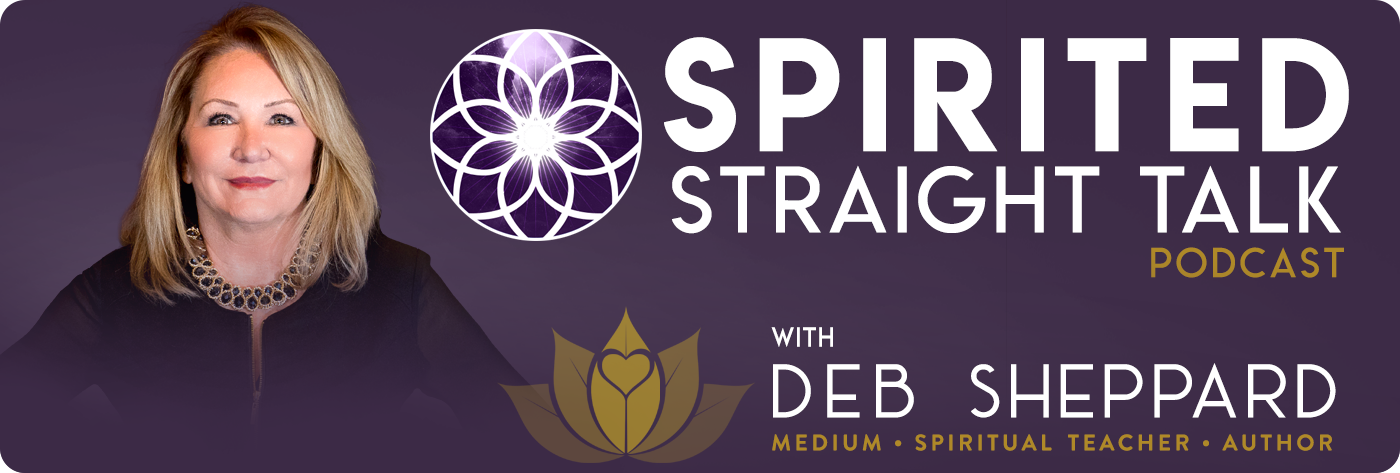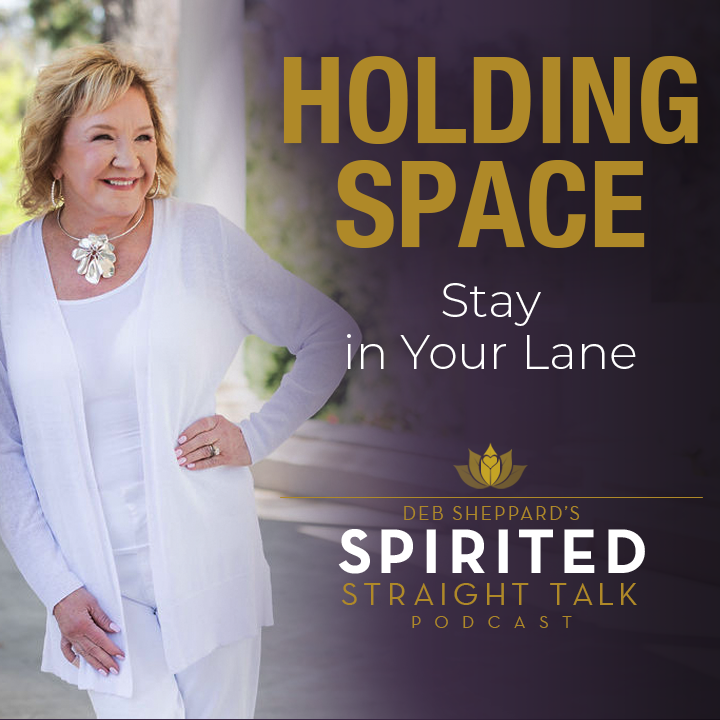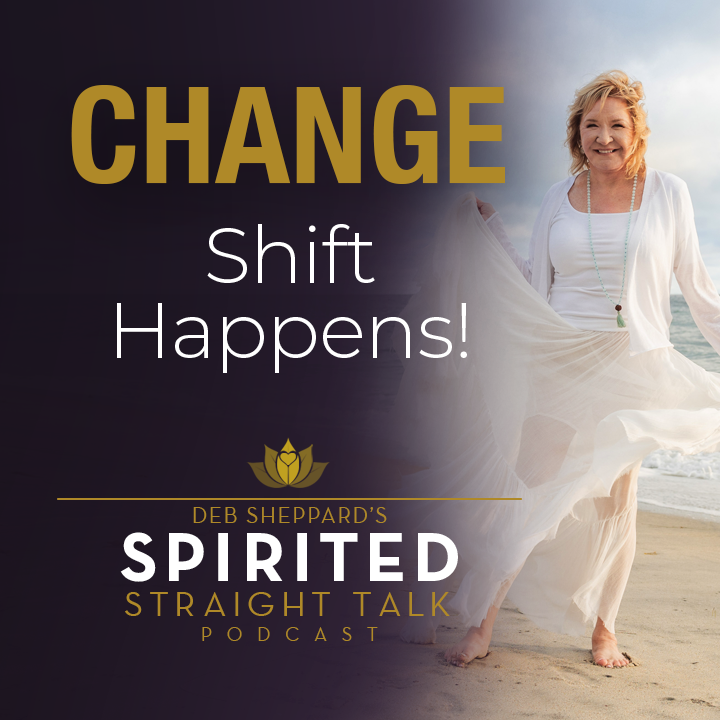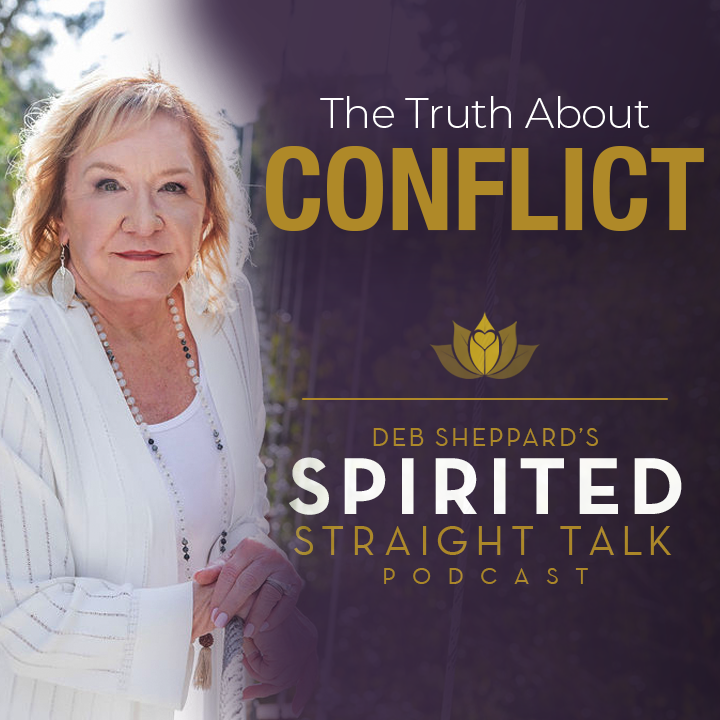
The Big Mistake We Make in Our Search for Unconditional Love
1 (6s):
Welcome to spirited straight talk, the podcast to help you thrive with the help of spirit. I’m Deb Sheppard, psychic medium spiritual teacher and author. Each week I bring new insights to help you heal from loss, connect with spirit and turn setbacks and to triumphs. So let’s get started. So if you’ve been listening to our podcast over, I don’t know, the last couple of years or whatever, it’s been, I’m with Dana and she’s with me again today. And I want to let her know that I love you unconditionally. So maybe the other at seven years. Yes. And when I met you, it was business terms, you know, we knew, but I just thought, wow, she’s really beautiful.
1 (54s):
She’s so smart. And all those great things that come to me about the person that you are, that I’ve gone to. Now, what’s interesting is I do love you unconditionally. And I know you love me unconditionally, but people around us don’t and it can be for many reasons. And I wanted to talk a little bit about those things, that there’s a definition of unconditional love that I teach that is very different than what people think. And even though you and I are together and same-sex relationship, that is not part of my past people, judge that in so many different ways. Even my brother with a sense of humor said, well, you know, are you a lesbian now?
1 (1m 37s):
And it wasn’t judgment. He was just trying to understand it. Right. But when it comes to us wanting to receive unconditional love, I think we get very confused by the terminology. So, yeah, and I love each other unconditionally. Not that there aren’t things that go on that you put up with me, I’m pretty sure and vice versa. And there’s people that look at us and go, I want a relationship like yours and it doesn’t mean same sex or things like that. It, it really means the energy between the two of us and how we try the best we can to support each other, be there and be okay with the differences of how we both have different ways that we work, how our minds work, what we think is important and the values like you put up with my neurotic, everything has to go into its place.
1 (2m 25s):
It was just good because it’s taking care of my stuff, but it’s also realizing that not everyone around you is going to accept that. And that’s what we call conditional love. And I’ve talked about this in the past. And so if you, regarding my parents that will allow me back in their life. If I become, we turn back to their religion. So they may love me and want good things for me. And they want me to be happy and they love and adore you. However, if I become your sister, sister white, but yeah, a sister in their church, and this is where we talk about conditional love. I’ll love you.
1 (3m 5s):
If you do these things, we get confused with that perception, which is unconditional love is loving somebody, no matter what, that’s what people say. However, we still put conditions on it or those around us. And so we try to change who we are to get acceptance by them. I was even thinking this about dogs because people will say often, oh, dogs are so unconditional. And I mean, you can really be bad to a dog and mean, and those kinds of things, and they’ll still come back. And of course we love our, for babies me a little bit too much, maybe at times, but we did have a big place for them, but people will even make comments regarding the dog you have.
1 (3m 50s):
Oh, I don’t. We have tiny dogs and I’ve had big dogs. Middle-size dogs, all kinds of different animals. And he’ll say, I just, don’t like tiny dogs. So judgment. We go back to what we like. And don’t like, versus isn’t that animal really cute? Or I’m so glad that you found something that you love. So if you’re in a relationship or you have family, whatever it is in your life, career siblings, friends, and they seem to judge you, that’s called conditional. That’s not unconditional. So I will give everyone my definition of how I interpret it. But then we ended up changing, hoping that that person will love us the way we need.
1 (4m 32s):
So they’re really not loving you. They’re loving their image. And we talk about this being in crowds about being accepted. So if you’re in a social situation and I call it the prostitute, how do you fit in there? You’re not really fitting in authentically. You’re fitting in for the circumstances. So when you’re looking for unconditional, it’s a very different type of understanding, and it helps you to stop trying to be someone you’re not to get approval. And I think it’s just coming to terms sometimes that we’re not always going to align. And we’ve even seen this over politics. We’ve seen this over religion, all types of things, where people have a feeling.
1 (5m 15s):
If you’re not aligned with me, I can no longer love you. And I find that fascinating. I think there’s nothing wrong with having different opinions, but the real part of this is does it separate us from that essence of love and you and I are, we’ve joined groups that are like-minded. Yes. And it’s very free to say whatever you want, feel like you’ve got that support. You know, you get cheered on and you feel like you feel that love like, oh, they get hit me. They get me. So you lay both have had times in our, in our lives where we try to tolerate a relationship, just because we thought, okay, this is what we’re supposed to do.
1 (6m 1s):
But bottom line it gets, we get burnout. We get exhausted. We get tired. We’re always the giver. You start getting sick. We’ve never been there that physically from forcing yourself to be in a situation that you’re not supposed to be because you keep trying to fix it. You keep seeing that essence of that person, that what you may be loved in the beginning or what you see in them. But why do we keep doing that? And can you love somebody unconditionally and release it? And that could be where they’re not doing their part as a partnership, and you can love them, but realize that maybe they don’t share the same roof or whatever it is with you that is assigned for you to have a, a different type of connection.
1 (6m 48s):
So one of the things I teach or in this unconditional love, this is my definition, so that we can move further in this. And if you’re driving, don’t stop. But later on, go back and write this, cause this is something really valuable and it will shift the way you perceive love yourself and your relationships. So my definition is being authentic to your soul and receiving love the only way they can give it. And it takes a minute for people to shift that because what you’re really doing is allowing people to judge you or abandon you or not support you, because that’s all they’re capable of.
1 (7m 31s):
So it’s how you unconditionally love them, but don’t change yourself based on what they expect from you, right? So to accept the judgment, the abandonment, everything they give you, cause that’s all they can give you. There are only cadence. It that when we look at that, people are limited. I would love for my parents to be able to say, you don’t have to be part of our faith, but let’s still have a relationship. I would love that. But in their mind and their belief, it’s, they’re not capable of doing that at this point anyway. Right? And so for me, it’s accepting that even though it hurts and I miss them and I wish it was different, I know that’s all they’re capable of.
1 (8m 14s):
And it helps me with my grief. It helps me to see them in a different way. It also allows me to love myself and not feel that I have to change to be in a life where I feel like I always will be judged or am always waiting for that feeling of, okay, well, we can’t do this anymore. And we’ve both felt this. Yeah, absolutely. And I think you come to a point where you have to create your boundaries with what you’re willing to accept, correct. Based on how they can only conditionally love you. And, and that’s the key word, conditional.
1 (8m 55s):
When their remember that’s what they’re capable of. If you’re looking for unconditional, that’s not how it works. It’s how are you unconditional to battle? So they can be conditional to you, but you are making the choice to allow them. And that’s the unconditional piece, but also the fine line with that is then how do you become confident with the boundaries you set? And I know that you set boundaries, you’ve recently set boundaries for the first time with them based on the way they were treating you. And so how do you become okay with having to set that boundary and still know that’s all they’re capable of.
1 (9m 40s):
I think it takes practice. I don’t think it’s something overnight. It’s not where I have a wan going, oh, guess what? I am going to be unconditional. Now it’s, it’s a process of unconditionally loving them. They can only love me with these pieces now deeply. I know that they love me as their daughter. They feel as if, yeah, I’m proud of you in certain ways or whatever their story is, but they’re also creating a boundary that we can’t totally accept you unless you fit into our lives. You know, unless you fit into this specific Bruce’s system. Yeah. Which I do not agree with. It’s coming to terms to having your own confidence, finding love in other ways.
1 (10m 22s):
And I think the biggest thing is loving yourself as well. And people there’s a saying, you know, you can’t love anyone else unless you love yourself. I I’m not, I’m not sure. I believe that. I think it’s a work in progress because we are hard on ourselves throughout life. And that’s why I started the podcast about how I unconditionally love you is because you know, you do love me. You care about me. You do things now. Are there times where I’m like, well, wait a minute. Why are you saying this? I mean, we go back and forth, but we didn’t talk about it. Yeah. And then we come to a, a place of an agreement to not understand each other and support each other because we are different people are in a different place when it comes to people judging you.
1 (11m 3s):
I don’t want to feel that I’m always on eggshells or feeling that I have to perform to be with family, that or friends or whoever. So I think it’s building your own confidence that you’re okay with who you are. And I know that’s a cliche. People say that, but it’s being in your power of, I really am. Okay. And I don’t want to be in that place for you to accept me and accept me. I’m okay with that. And I don’t accept their religion. So how is it any different? The differences is I’m willing to have a relationship with them, even though they have a different belief. That’s true. Yeah. I mean, I’m not because you don’t agree at all with their belief system and you know, you made conscious choices to separate yourself from that because you realized how cult-like it was, it is, is, is it’s, it’s an religion, but, but I would accept them.
1 (11m 57s):
Yeah. I’m like, I’m okay. Loving you. If you want to do that, that’s fine. I’ll love you. If that’s what you love. And they come back with, we can’t have you in our lives. If you don’t believe the way we believe, and you have to believe this way or else you can’t, we can’t be connected with you. Which when you say that out loud is like, what? I think it’s fear-based for most people. And that’s where I see if people feel like they can’t be with others that are different than them. It’s fear-based like, it’s like, it’s a virus you’re going to catch it or something which has infiltrated our political system a hundred percent divided us tremendously because of that, correct?
1 (12m 39s):
Is if you, if you have a different opinion, you’re not a part of my world. Right. And we’ve, we’ve been, the victims turned myself into a victim, but of people ending relationships for that reason, because we don’t believe the way they believe and we’re not going to and that’s okay. Would I find it fascinating is we are willing to be in a relationship with them, even though there’s big differences issues we may put, like you said, those boundaries, like these are not topics on the table. Let’s have it differently. But for, for others, they don’t want to have the boundaries. They basically say we are not aligned in this one area of our life. So we disconnect.
1 (13m 20s):
And again, this is where we get confused with unconditional love, love, support, connection, those types of things. So if you feel like you’re, you’re only outside of perhaps your family, I hear this all the time. You and I have been on the outside of our fitness. Oh yeah. We call it the black sheep. I just put myself there now. I’m like, you know, I’m in a good and well, I’m comfortable with it now. I don’t like being like all the rest. That’s what about all of these kids that are disconnecting from their parents right now? Big. This is like such a big deal right now for so many people that come to see you. Right. I don’t know if it’s just because that’s what the world is going through or that’s because it’s, you know, that collective and we’ve been drawn to you, but we see this as a big thing right now in our personal life too.
1 (14m 13s):
Yeah. That’s what I need. So I, I would, I look at, when I look at generational things of how we believe and how we work and where we open those limits or where the boxes are or things that we believe more pass that we bring into our future. It’s all trying to unwind it, I guess, would be a good way to say it. And I think that where we even talked about this on a previous podcast about tic talks where kids are not doing those jobs where you and I would say, well, yeah, I had to put 14 hours in where they’re saying, well, you hired me to do this. Maybe you need to re figure out what’s going on. Except in the case of our one son right now, trying to make money. And he’s like, oh yeah, they put me on Mondo, mandatory overtime, a couple hours each day.
1 (14m 59s):
And he’s like, great. I’m making. Yeah. But those are choices versus we felt obligated and guilt and shamed if we didn’t, they chose those jobs. Yeah. And so I think the generation has seen the previous generation, not always being happy, divorces relationships, not working divisions in the family, financial struggles. And they’re choosing to say, I don’t want to do that in my life. So that’s one piece of it. The other part, I think, is important. What I believe is what’s happening with these kids is they’re trying to figure out things. And part of it is maybe pushing the parent away to figure themselves out. I mean, you, I could’ve abandoned my parents a long time ago, but I chose to keep it and make that work.
1 (15m 45s):
I think for some of these adult children are separating and I haven’t really figured it out, but I feel like they’re pulling away trying to dig without the influence or they’re projecting stuff that it’s our fault. And I’m not sure which is right. I would love to hear a perspective from young people that are disconnecting from their parents because they sh I’m sure I could learn a lot and figure it out. What’s interesting is they’re not wanting to talk about it. I’m hearing this. They’re just cut it off. There’s no reason and no feedback. So this happened with me a couple of years ago, though, where I got upset about several things that had happened.
1 (16m 27s):
And this is, you know, this is just a familiar thing with my family. And I, I got upset instead of communicating about it. I didn’t have the emotional capacity at the time to really dig into it. Cause there were so many different things going on in my mind. Lots of layers. Yeah. And so for a couple of years, I disconnected. So I wonder if that’s the same mentality is like, I just don’t have the emotional capacity to dig into this with you right now, because there’s all these other things that are on my plate that I’m trying to dig into and handle. And I wonder if that’s, that’s what it reminds me of an apparent wants to fix it.
1 (17m 8s):
And what do I do for a living, right? We fix it. You help people fix their things. No one’s broken. They just make you dead. And I think it’s also allowing parents or adults that took care of kids just to step back and go let them have their journey. And don’t keep trying to change or force the issue. Let them figure things out and not take it personally because in my situation I’m told, I, I love you. I still love you. I don’t, there’s nothing about that. I still love you, but I need this space. Right. And that’s exactly what you felt. And it’s remark reminding ourselves that each person has their own way of healing, striving, finding their own comfort, finding their own.
1 (17m 55s):
Self-love finding their confidence, finding their voice. And how do we allow to let that happen? And what’s coming to mind is the transformation of a caterpillar it’s in that cocoon state where it’s trying to figure stuff out. If we disrupted that we’re going to destroy it. We’re not going to let it come to fruition. So if we think of these situations as being in that cocoon state and they’re growing and developing and healing and getting ready to stretch their wings, it might help us in our healing process. So circling back to unconditional love. So with situations like this, is it that again, that they’re loving you, the only way they know how, and that’s what distance.
1 (18m 46s):
Yes. That’s all they’re capable of. And it’s hard. It’s so hard. And for me lately, it’s been bookends, right? Both sides of it. And then you think of myself, I think myself, like, well, maybe there’s something wrong with me. And then I look at how many people I help or our relationship. I mean, we have such a fabulous relationship that, and can we go through our stuff? Yeah, we do go through our stuff. But yes, I agree pretty quick. Yeah. We, we deal with it. We have taught them to understand each other and where we’re coming from versus neither one of us are fighters. No, we’re not. We don’t raise our voices. No. Ever.
1 (19m 26s):
Yeah. So she does what I say. Can I say that out loud? I said that out loud. I think we feel that when there’s a problem, we need to fix it. Versus sometimes thinking of that caterpillar in the cocoon and how people feel about you. Doesn’t create a value. Love comes in many different forms. And I was doing a little bit of research before this topic and archeologists and historians have looked at how service stations have developed and gone away. And it it’s interesting because when there’s division, when there is wars, things like that, there is a division where things fall apart and it’s that, you know, ending and rebirth a new beginning.
1 (20m 16s):
So when someone is judging you, the unconditional love piece is they can only love you with the tools they have. If they’re in fear, if they feel connecting with you or any of these things is bad for them, it’s their journey. But it doesn’t represent who you are as a human being and teaching this and living. It are two different things because we do have grief. And I have spiraled at times, I’ve gone down that rabbit hole when I felt wow, what did I do to deserve to deserve this? Right. What I have learned through the years is not to change who I am to get the love.
1 (21m 1s):
Now, if I made mistakes and I’ve heard somebody there’s nothing wrong with me, apologizing taking accountability, trying to heal that relationship, building the trust again. However, look to see if really what their disconnect is, is something you did or where they need to be. Right? Yeah. So talking about unconditional love again, I’m hoping you’ll share this. You, we did some breath work a while back and don’t explain what that is to work. So this is a specific type of breathwork and actually we hopefully will offer some classes on it at some point in the next year.
1 (21m 42s):
It’s a deep meditation where you use your breath to go into a state of transcendence. We’ll just say it that way, getting out of your own way. And it helps you connect with the divine. And when we did this meditation, your journey on this meditation school is very cool. Yeah. So what I am hoping you’ll share is how you felt that you were just surrounded by love. That’s all there was. Right. But yeah, sharing that story. So during meditations, over two decades in different ways, I basically went into this minute meditation and breath work relatively quickly, which I was glad because otherwise I’d have that monkey brain going on.
1 (22m 33s):
Recognize I went so far back. It was before the Milky way had, you know, the big bang theory. It was way before then, but the big bang explosion, that’s a shit show that tells you something. So I go there and I’m just seeing this deep love of the beginning almost of time. And I did see other worlds like galaxies and stars and moons and planets. There was such a sense of great peace, a sense of that, love that you feel you have those certain times, you just have that love, but maybe there, when you’re seeing your child’s your heart, right.
1 (23m 17s):
That nothing else can get into that energy. And I felt almost teary-eyed my heart was open and felt. This is the essence of who we truly are. That’s what I felt. This is the beginning of who we are. And because we are made from stars, it made sense of this deep feeling of love and gratitude connection collected. And I’m going to filter it a few times, but not like this, especially recently when started coming more forward, I got to see other things. Of course I saw guides and you and, and different experiences, but it felt like Tago the guides in the, in the cave.
1 (23m 57s):
Yeah. The best way to say it is a after I experienced, you know, before the bang Siri, you know, before the, the big brain, I felt this place, that the best way to say that resembled a CA even a large mountain. And they’re all women in this cave and I couldn’t see faces, but I saw these robes very like linen cotton, not, you know, nothing flashy. And I could see it’s almost like the Akashic record. Yeah. So if you’re not familiar with Kaushik records, whenever I do your past life, your souls contracts connect with your guys, your loved one. I go to a place that’s called the Akashic records and it didn’t look like the typical one.
1 (24m 40s):
I always see it was, it looked different, but there was darkness around like it was night, but in that cave area, it was a lit candle or a fire or something. So I could see the warmth of this. And I could hear them telling me that you are going to be you in my life for a reason. And you were coming here to help me and to never let it go. Hmm. Wow. And I was like, well, of course not, they’re going, no, we need you to listen to it. But that again comes back to the unconditional love that it doesn’t mean you have to be completely aligned with something or someone. What it means is that you’re allowing people to love you the way they can.
1 (25m 21s):
And to realize that if they’re, if they’re struggling to love you the way you, that’s not really the point. It’s finding ways to love, finding things about yourself that you love. And the unconditional part is be allowing other people to love you as limits because allowing of other people to love you with limits, because that’s all they’re capable of versus having expectations that they can’t perform. When you feel like you want them to love you a certain way, you’re actually putting conditions on them. I need you to love me this way or else. So if you understand that you’re saying, I will do all these things, but I have expectations.
1 (26m 6s):
This is not a brighter. This is now I’m going to buy this. I’m going to pay you this. And you owe me this. And that’s where I think we get the disconnect. You should let me the way I need. And that’s called conditional love versus unconditional love. Does that make sense? Got it. Yeah. So what I want everyone to do to think about this is write down the people in your life that you would love them to love you, just the way you are, what would you need from them? And then realize, are you putting conditions on them? Is it really helpful to expect from them?
1 (26m 46s):
Just like you wouldn’t want someone to have expectations on how you love them. And that’s going to shift your energy of not working so hard and feeling disappointed and not worthy of someone’s love. It’s about what can people give and what are you willing to be able to say, that’s all they can do. And then live your life that way versus feeling disappointed and valued, not important, and then find those. And it might take multiple people to show you how much they love you. And it’s not just from one individual. It may be from multiple. And that’s how you’re going to find peace, serenity, and love and all those things that we’re looking for on this planet.
1 (27m 31s):
Thank you for joining us once again on spirited, straight time. Thank you for listening to today’s episode. I hope it inspired you. If you enjoyed our conversation, make sure you subscribe so that you get notified of new episodes and let’s get connected. Visit Deb shepherd.com for more insights, support workshops, and a book, a session with me. And finally, always remember your loved ones in spirit, or just a thought away, even though they’re on the other side, they’re always by your side.




